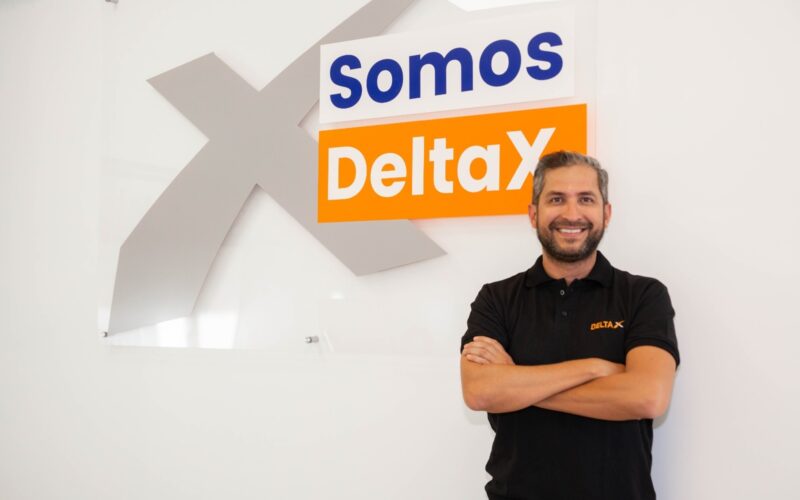Today, we have the pleasure of speaking with Luis Fernando Ortiz. Coming from a family of logistics experts in Santa Cruz, Bolivia, his grandfather was a truck driver and his mother ran a sugar distribution company that operated several trucks. After completing university, Luis Fernando joined the Ultramar group, a major logistics operator based in Chile with operations throughout Latin America. Four years ago, he returned to Bolivia and launched DeltaX in February 2020, with the vision of modernizing and resolving the inefficiencies of the logistics industry, which he has known closely since childhood. We are excited to learn more about his journey and DeltaX.
What is DeltaX?
DeltaX is a digital platform that connects cargo trucks with those who need to transport goods, such as shipping companies, cement companies, or beverage and food companies. These companies transport thousands of tons daily in Latin America in a traditionally manual way, using phone calls, WhatsApp, and emails. We address this inefficiency with our platform, which automates processes and provides greater operational control for shippers.
What is the market size in the Andean region and Mexico?
Inter-American Development Bank estimates that around 3.5% of Latin America’s GDP is spent on ground transportation, which amounts to just over $170 billion annually. However, it is a fragmented industry, with about 4 million truck drivers, excluding Brazil, moving cargo in Latin America daily. Additionally, this population is not digitalized; most are older adults, many with over 30 years of experience driving the same routes, who have difficulty adapting to digitalization and are accustomed to manual processes that they have followed for 30 or 40 years.
We serve various industries. In the beverage and consumer goods sector, we work with companies like AB InBev and bottlers of Coca-Cola and Pepsi, as well as local clients in Mexico, Peru, Chile, Bolivia, and Paraguay. In the shipping sector, we collaborate with Medlog of Mediterranean Shipping Company in several ports on the west coast of South America. In the food sector, our platform moves soy, fish, and wheat flour, corn, sugar, and other processed foods, working with a broader base of local clients. In the construction materials sector, we transport cement, iron, coils, ceramics, paints, and more, with clients like Itacamba Votorantim, Promart, Inkaferro, and Faboce, among others.
What products does DeltaX offer?
We offer a Software as a Service (SaaS) product in a white-label format. Clients use our platform and customize the tasks or workflows according to their transportation needs. They also customize the documentation they want to control and the users who will participate in these processes. Finally, if they wish, clients can share their fleet on complementary routes to reduce empty trips and transportation costs. Once the platform is up and running, we connect all transportation providers and users, and the system starts operating automatically. Our software allows the shipper to control their entire operation in one place, which was previously managed through WhatsApp, emails, or Excel. Additionally, we use machine learning models that learn and automate processes, recommending loads and trucks operating within the system to share our clients’ logistics networks, thereby reducing empty trips.
You started in Bolivia and have expanded to other countries. How has that experience been?
We started in Bolivia in 2020, where the truck market is very informal. We faced significant challenges both in digitalization and business formalization.
In Mexico and Peru, there is a higher level of formalization and digitalization. In both countries, for example, the national tax services have implemented the carta porte and digitalized several processes, which has helped our operation. We are very pleased with our progress in both countries; in less than a year, we have become profitable and have a portfolio of clients who are leaders in their respective industries moving cargo.
Chile, in comparison, is a much more formal and concentrated economy. There are large transportation companies and logistics operators with significant fleets in Chile, which are the main players facing large cargo generators. This has been a challenge, but we have successfully introduced our SaaS product to the market. Currently, we work with the largest sugar producer in Chile, Iansa, among other clients who use our software.
What are the biggest challenges, and how are you overcoming them?
The biggest challenge we face in this industry is digital adoption, especially of transporters. It is a challenge to ensure they can manage the workflow entirely independently. We also face challenges with shippers. In some cases, they request physical documentation of the shipment or proof of delivery before invoicing, which delays the payment process for transporters. This makes digital adoption and end-to-end digitalization of the workflow significant challenges at both ends of our operations.
What’s next for DeltaX?
We aim to consolidate our operations and continue marketing our SaaS. Currently, we are evaluating use cases in the food and beverage sectors in Colombia, Argentina, and Guatemala. We hope that some of these cases materialize by the end of the year, but without requiring a physical presence in the medium term. We will serve these markets from Mexico, Chile, or Peru, which are our operational centers for marketing the SaaS.
Additionally, we have launched a factoring solution in Mexico in partnership with Xepelin, to provide financing solutions for transporters. In Bolivia, we carried out an unprecedented financial operation by issuing private promissory notes in the local market, which provides prompt payment solutions to drivers operating on our platform.
With this mix of software, financial, and operational solutions, we aim to make DeltaX the largest digital platform for cargo and trucks in Latin America this decade.
This post is also available in: Español (Spanish)



